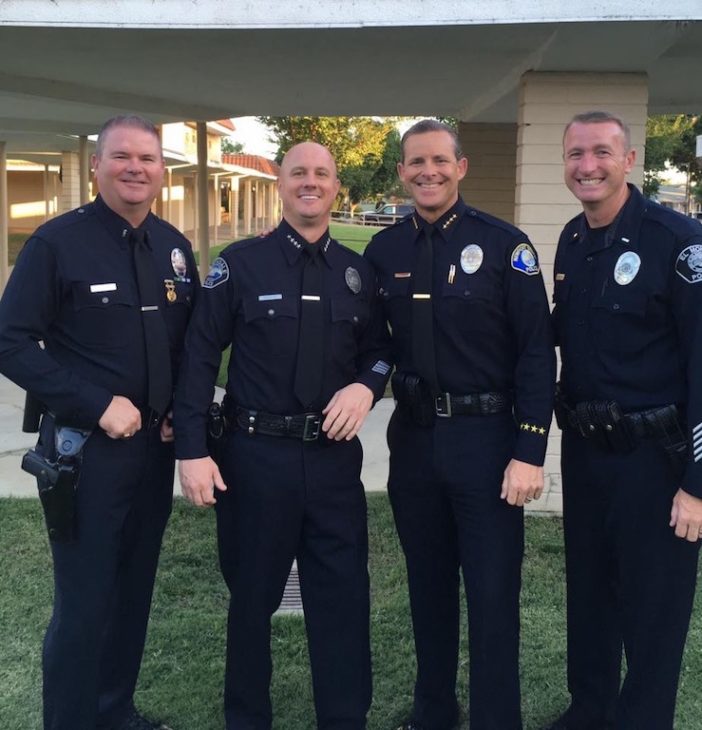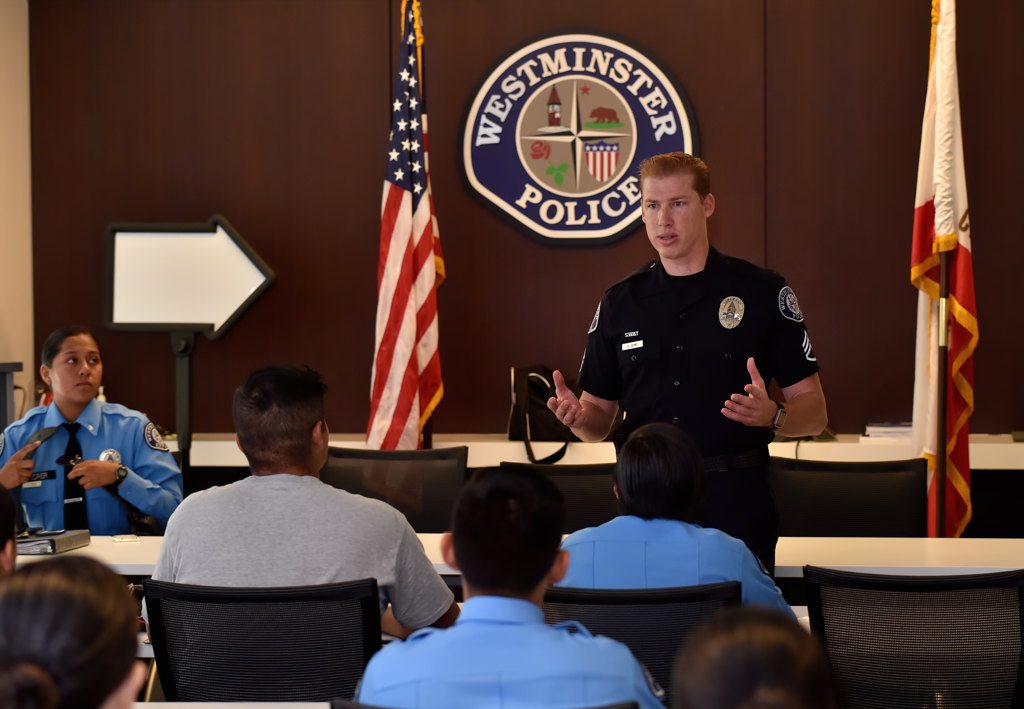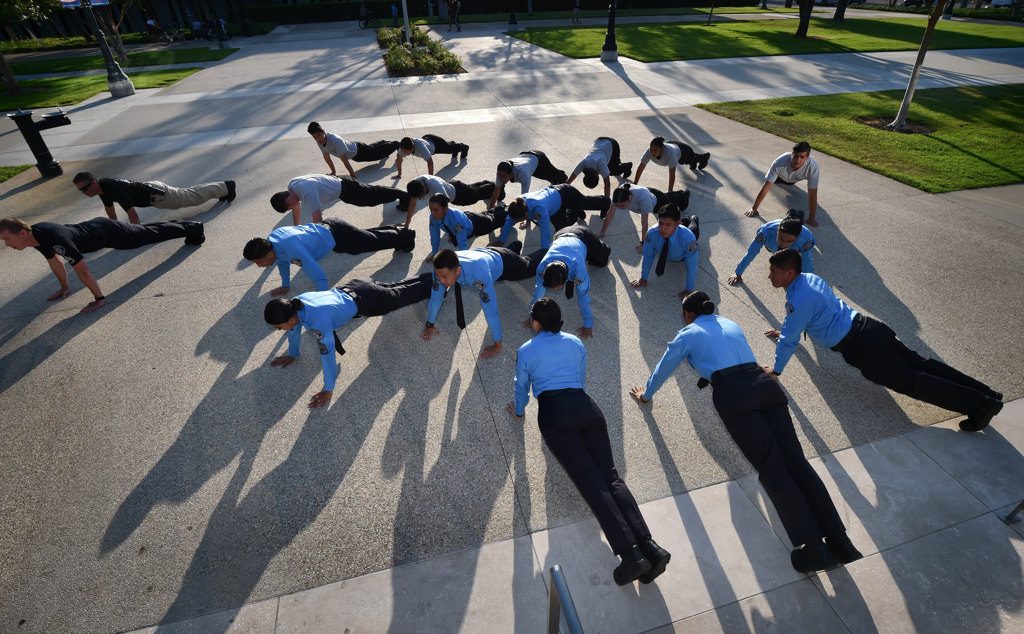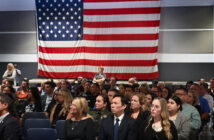Los Angeles Police Department Lt. Randy Goddard always knew he wanted to be a police officer. A fan of the TV show “CHiPs,” he had his eye on becoming a California Highway Patrol officer.
At age 15, he attended an explorer meeting at the Westminster PD, where he met explorer advisor at the time, Al Brackett. He was hooked. Though he later decided to stick with a local agency rather than the CHP, his law enforcement path was set. And his time as an explorer played a large role through the process.
“It really gave me firsthand experience into what police officers do by being able to interact with them, going to ridealongs,” he said of his time as an explorer between 1990 and 1994.
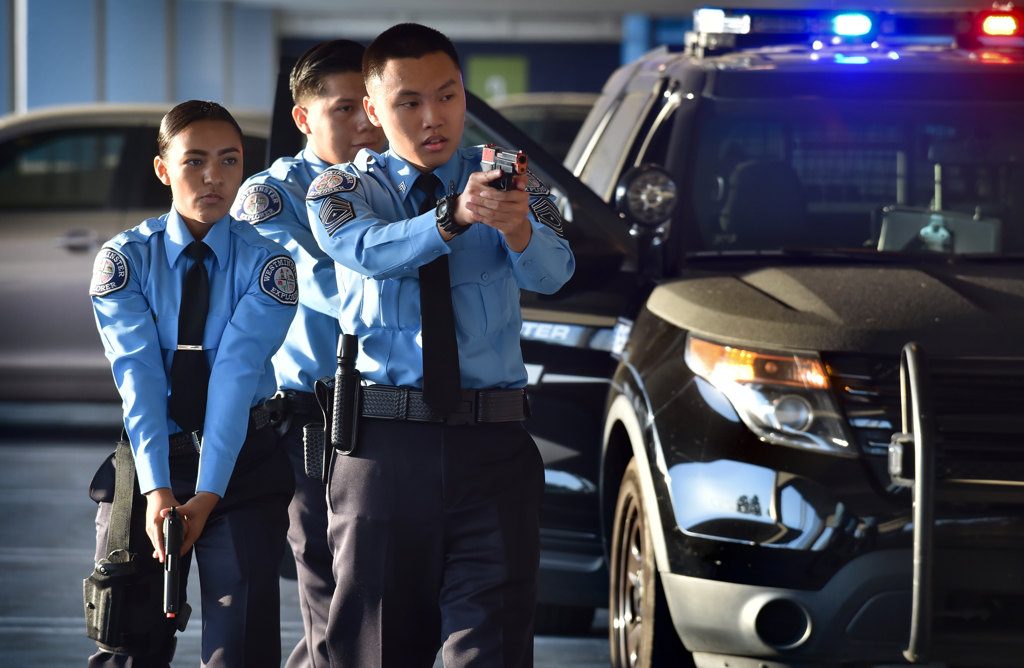
Westminster PD explorers Alison Guevera, left, Guillermo Mendez and Sgt. Jonathan Vochung approach a suspect during an apprehension training lesson.
Photo by Steven Georges/Behind the Badge OC
During that time, he also made lasting friendships with other WPD explorers – among them Ty Henshaw, Jon Lewis and Shane Buckhannon – all of whom have gone onto successful careers in law enforcement. Henshaw is the new chief of the Irwindale Police Department, Lewis is the chief of the Newport Beach Police Department and Buckhannon is a lieutenant at the El Monte Police Department. The four still keep in touch, including recently gathering to support Henshaw’s swearing-in ceremony as Irwindale’s new chief – and they like to send pictures when they’re together to Brackett.
“There’s more than just the four of us that ended up being police officers,” said Buckhannon.
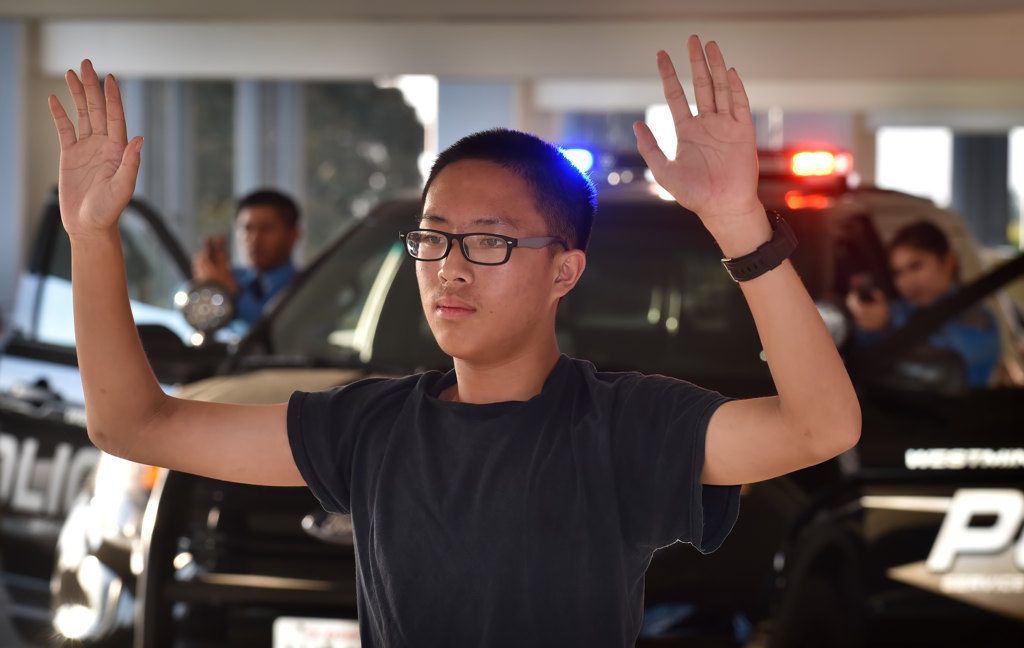
Westminster PD explorer Alex Nguyen-Vo plays the part of a suspect being taken into custody during an apprehension training session.
Photo by Steven Georges/Behind the Badge OC
In fact, Brackett himself joined the WPD explorer post in 1979 at the age of 18. He left the post in 1981 to enter the police academy and later became the first WPD explorer to be hired as a WPD officer. He started volunteering with the explorer program after his probationary period ended a year later.
“I wanted to give back,” said Brackett, who retired in 2011 after 29 years at the WPD. “That led to a 28-year engagement with the explorer program.”
He said that more than 60 youth that came through the program while he was advisor went on to law enforcement careers.
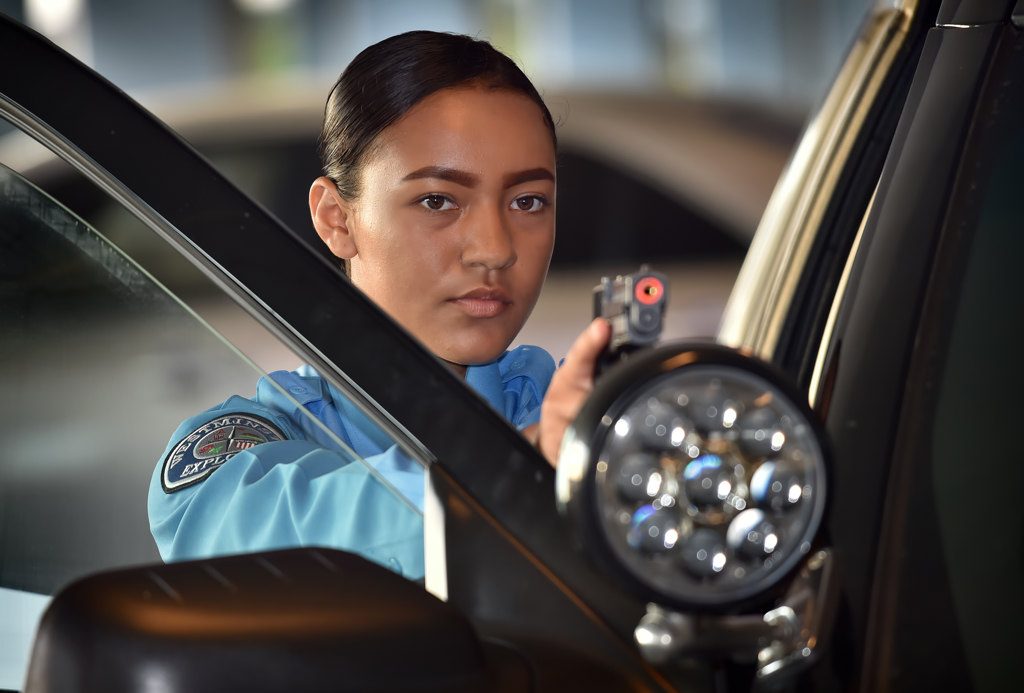
Westminster PD explorer Alison Guevera gives orders to a suspect during an apprehension training lesson.
Photo by Steven Georges/Behind the Badge OC
“They’re throughout California,” he said. “It’s just an honor.”
The WPD is now home to many former explorers as well. Among them are WPD Det. Commander Al Panella and Sgt. Scott Gump, who was a WPD explorer for nearly seven years and has been an advisor for about 10.
“There are a lot of success stories out there,” said Panella, who first became a WPD explorer at 14 and stayed in the program for six years. “I really attribute to it a lot of my success.”
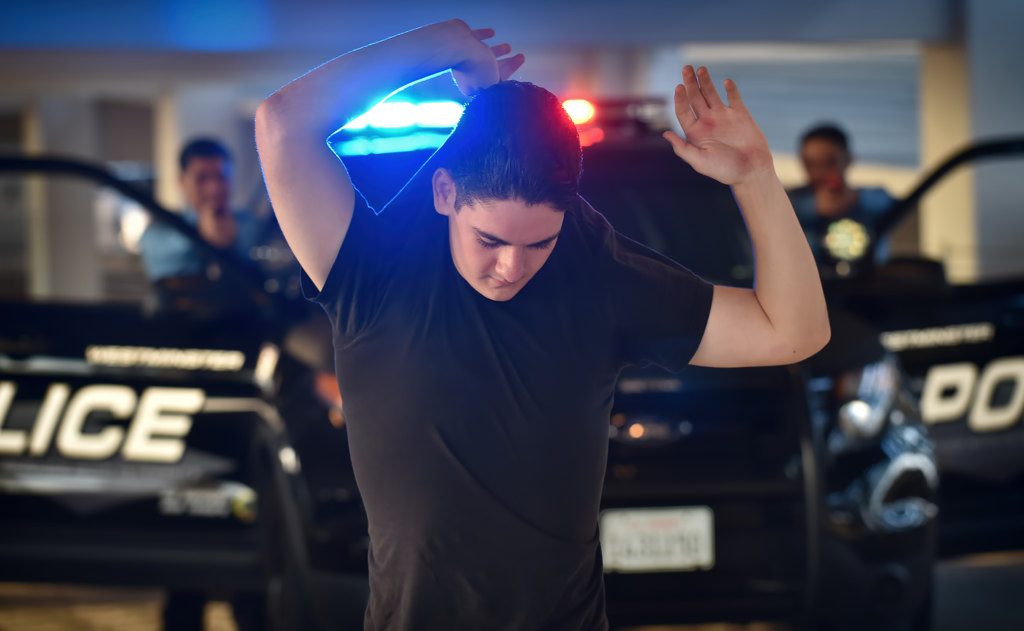
Orders are given to Westminster PD Explorer Devin Gallardo, playing the part of a suspect, to lift his shirt in order for others to determine if he is carrying any hidden weapons before being approached and taken into custody during a training session.
Photo by Steven Georges/Behind the Badge OC
Things have really come full circle. Not only does Panella administratively oversee the program, but his 16-year-old son has been a WPD explorer for 1 1/2 years.
“He’s doing really well,” said Panella, adding that his son is very enthusiastic about joining law enforcement – particularly after joining the explorer program. “The post enables [explorers]to really get into the nitty-gritty of what the job is all about.”
Gump said his time as an explorer pushed him ahead of the pack by the time he entered the police academy. He already knew radio codes, penal codes and how to talk to people in a law enforcement capacity.
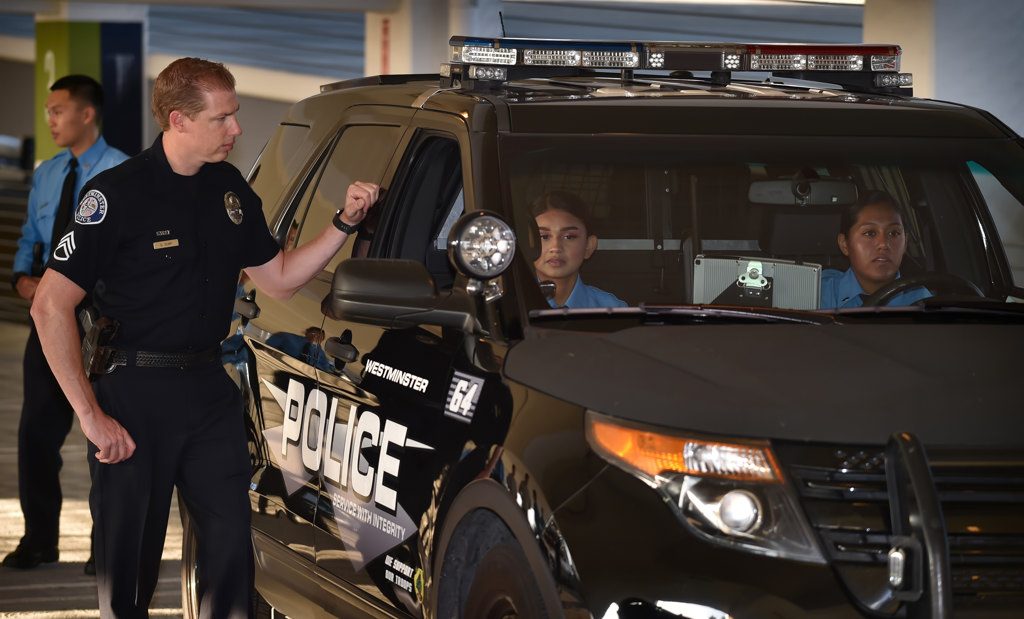
Westminster PD explorer Advisor Scott Gump gives some last-minute advice to explorers Sgt. Grace Eusebio and Lt. Vanessa Cruz, right, before the start of an apprehension training simulation.
Photo by Steven Georges/Behind the Badge OC
“Our biggest tool is how to talk to people and how to read people,” he said, adding that he went on more than a couple hundred ride-alongs as an explorer. “Instead of going into the academy blind like a lot of the recruits do, I already had a leg up.”
The program continues offering the same types of helpful educational tools it did when Gump was a member – including scenario mock practices for domestic violence calls, car stops, buildings searches, etc. Gump, a member of the SWAT team, and the other advisors, have much to pass on.
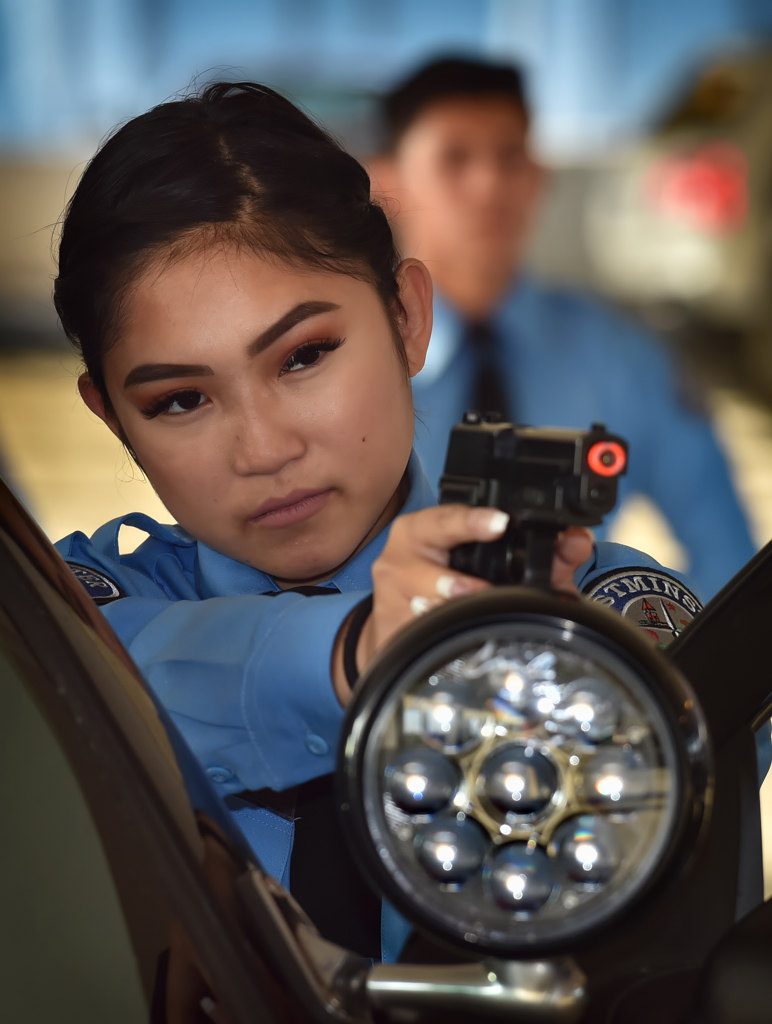
Westminster PD explorer Capt. Nhu Nguyen uses a car door for partial protection during a suspect apprehension training simulation.
Photo by Steven Georges/Behind the Badge OC
In addition to classes, ridealongs and community service hours, explorers participate in an academy, which is an out-of-state competition against other explorer posts.
WPD Det. Paul Walker, lead explorer advisor, said his goal with the program is to help good kids achieve their career goals, whether they go into law enforcement or not. Two of Walker’s own daughters were explorers for a time.
“It’s been the most rewarding part of my career,” he said, adding that he likes to keep track of his former explorers to see how they’re doing. “We’ve had kids who’ve gone into the military.”
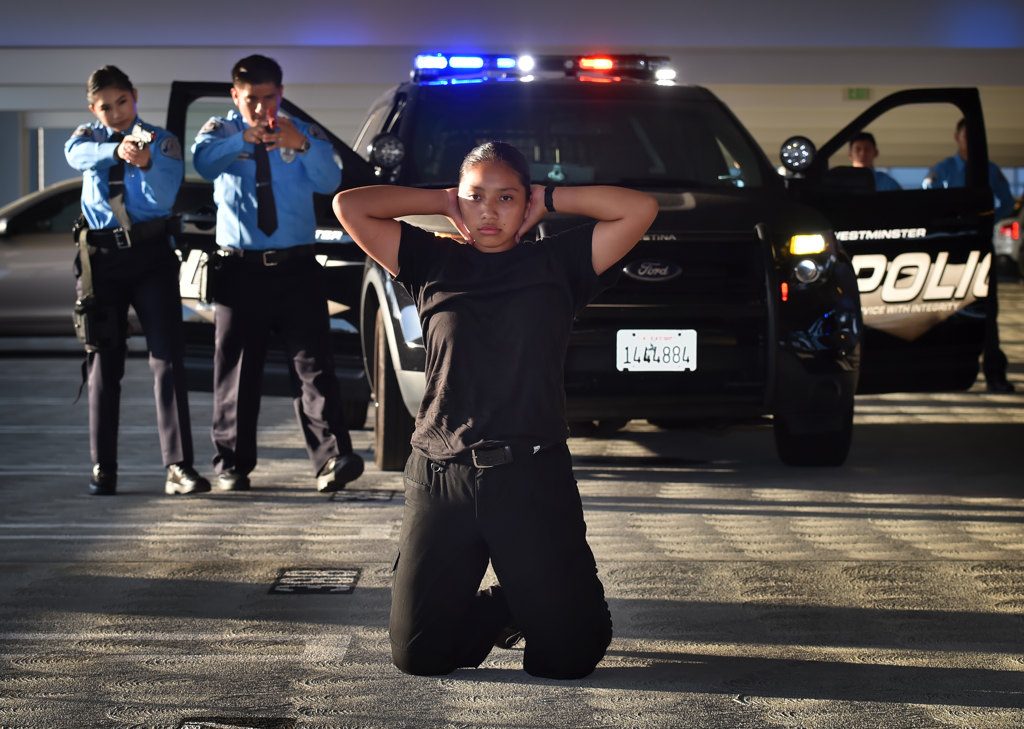
Westminster PD explorer Leslie Lloyola plays the part of a suspect as she follows orders from her classmates, including Capt. Nhu Nguyen, left, and Lt. Domingo Palacios, during an apprehension training session.
Photo by Steven Georges/Behind the Badge OC
He notes that the program often attracts kids who are already on the right path.
“It’s not a second-chance program, it’s kids that already have that frame of mind: ‘I want to be a leader in the community,’” he said. “Most of these kids, they already have their heads on straight.”
WPD explorer advisor Sgt. Michael Harvey said their agency has one of the larger programs in the county. Explorers – ranging in ages from 14 to 21 – serve in the community in all kinds of events, including the Garden Grove Strawberry Festival, the Fourth of July and memorial ceremonies.
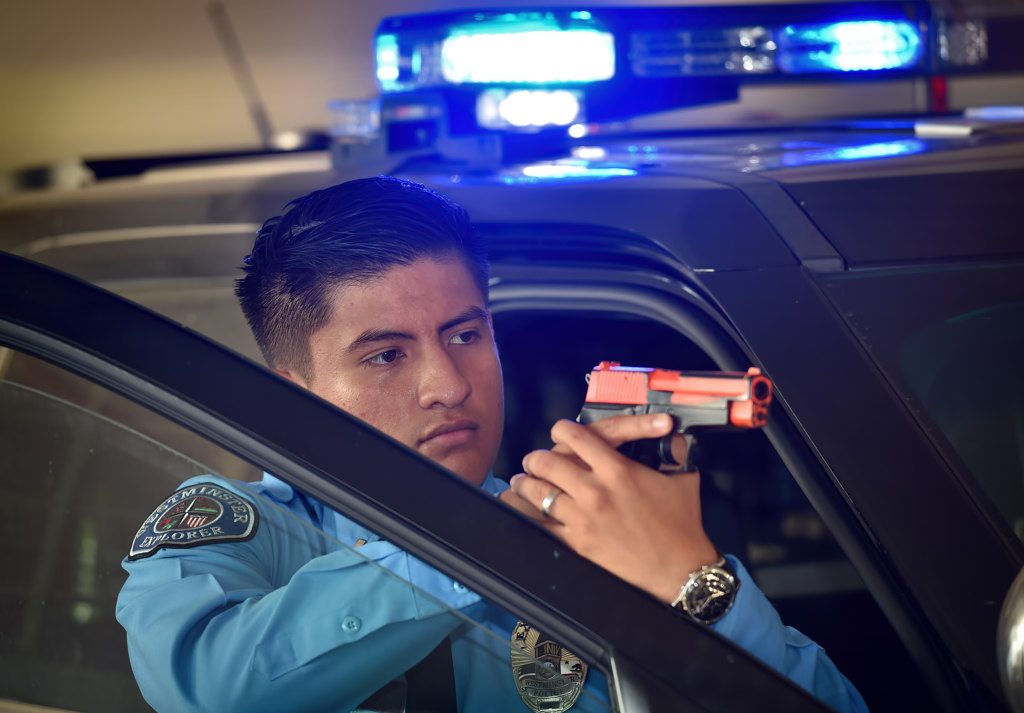
Westminster PD explorer Lt. Domingo Palacios uses a car door for partial protection during a suspect apprehension training simulation.
Photo by Steven Georges/Behind the Badge OC
“They’ll be at all our major events,” he said. “Anything that would help take the pressure off the police department.”
The program teaches them good life skills in general.
“It teaches them a lot of responsibility and structure and respect,” Harvey said. And it helps build confidence. “It’s pretty funny to see the kids who start off – they’re pretty timid, really quiet, and then a month later you can’t shut them up.”
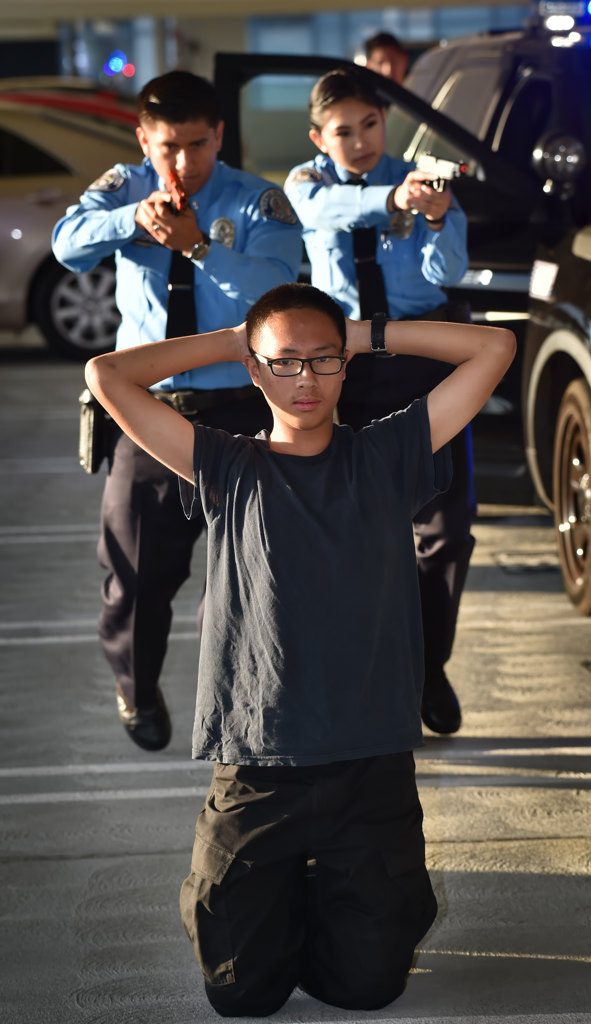
Westminster PD explorer Alex Nguyen-Vo plays the part of a suspect being taken into custody as Capt. Nhu Nguyen, left, and Lt. Domingo Palacios approach during an apprehension training session.
Photo by Steven Georges/Behind the Badge OC
For some, the advisors can become like parent figures — as was the case for Goddard, who lost his parents at a young age. For others, it’s just an invaluable experience.
Henshaw, who joined the explorers at age 16, said: “That type of exposure was so beneficial for me and I know for anyone else that’s in that program.”
Lewis said: “It really gave me an idea about how I wanted to spend my future… It kind of gave me a front-row seat to police work … and from those early experiences, I felt it really solidified my resolve to be a police officer.”
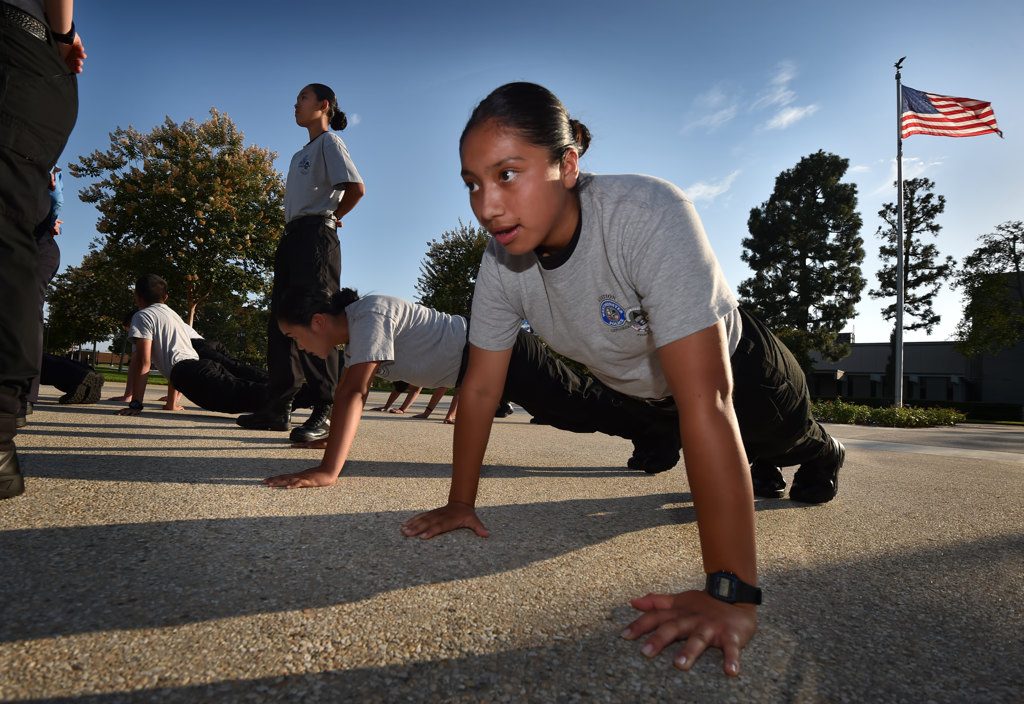
Westminster PD explorers Jasmine Ngo & Leslie Lloyola join her class with a few pushups.
Photo by Steven Georges/Behind the Badge OC
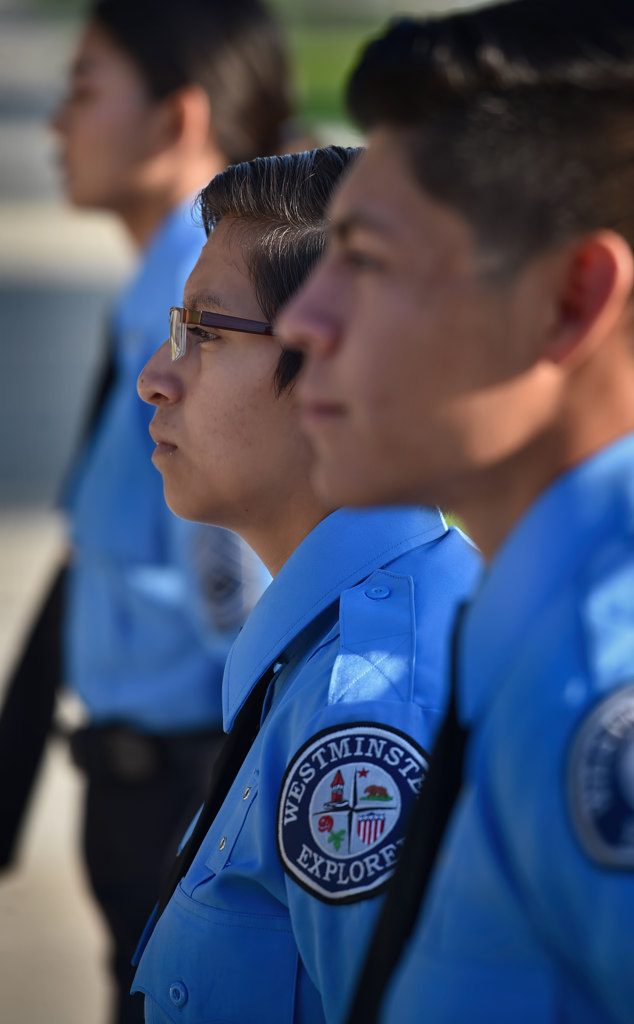
Westminster PD explorers Elizabeth Hernandez, center, and Bryan Balderas, right, line up at the start of a training session at police headquarters.
Photo by Steven Georges/Behind the Badge OC
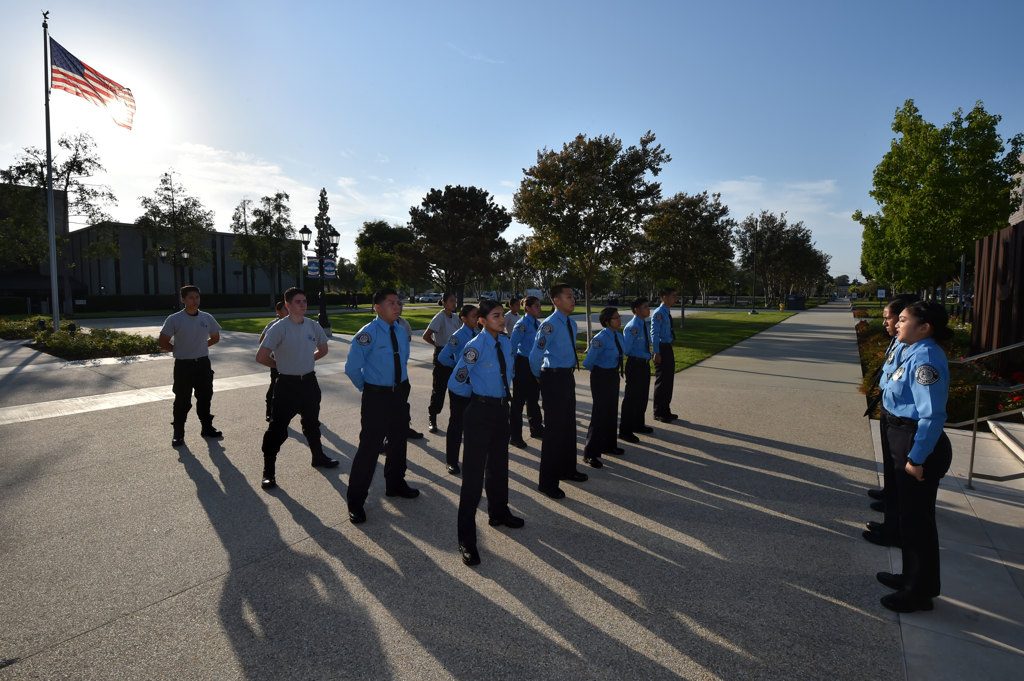
Westminster PD explorers line up to start a training session at police headquarters.
Photo by Steven Georges/Behind the Badge OC
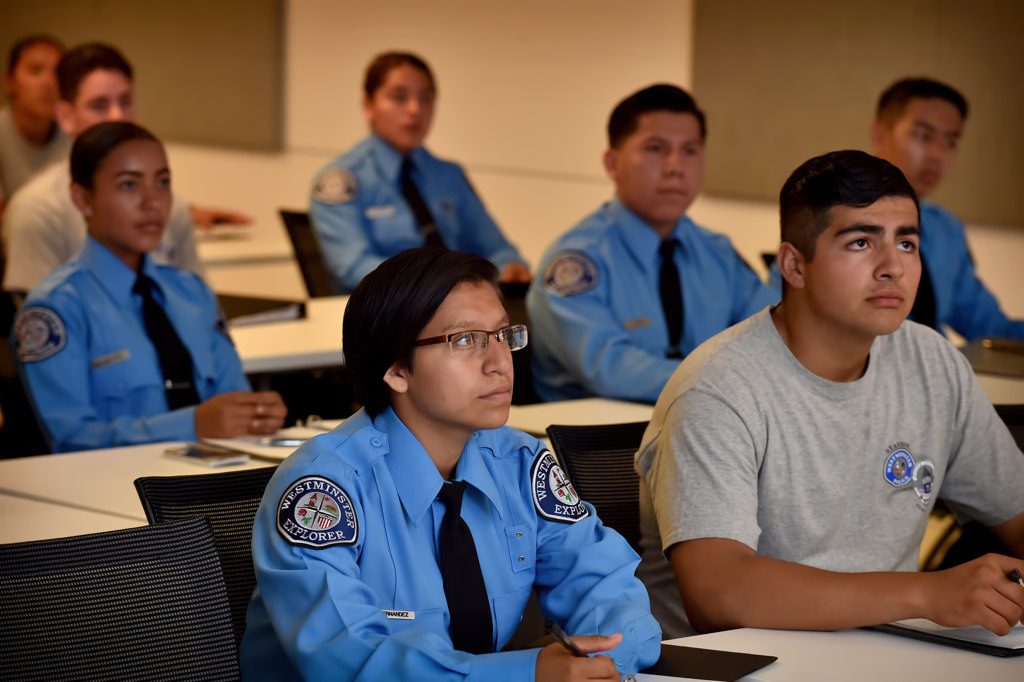
Westminster PD explorers, including Elizabeth Hernandez, left, and Adrian Alcala, attend a classroom lesson on police techniques during a Westminster PD explorer training session.
Photo by Steven Georges/Behind the Badge OC
 Behind the Badge
Behind the Badge
